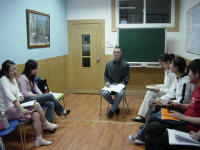|
DOSES OF ENGLISH
I think that Sera has been doing a wonderful job documenting our life and experiences here in Dalian. However, it seems that it would be appropriate for me to give my perspective from time to time as well. The first thing that comes to mind to talk about is the teaching here. I teach a range of classes at the Future In general though, the kids are happy and pliable enough to go along with whatever the Chinese teacher and I have in store for them. It is kind of hard for me to think of myself as someone who teaches small children. I’ve never had anything but cursory interaction with such young kids (since I was one) but there I am playing games and making faces. I still refuse to sing songs, but they are easy enough to avoid and I don’t think anyone has noticed. In the end, because kids are really cute and since these classes are over almost as soon as they begin (the classes are 1.5 hours long but I am only in them for a half an hour) I wouldn’t like a schedule without a few of them. After the kids are old enough to be without their parents they continue on the conveyor belt journey towards English proficiency. As the classes get older and/or higher, the level of grammatical complexity gets more advanced. After the parent/child classes there are nine classes that include both the foreign teacher and The problem I have with these older kids is, barring my lack of good classroom management, the manifestation of a much larger problem. The kids don’t really want to be there. This is their weekend, their free time, and they have to come and sit in a classroom for two more hours. Far from the rather carefree and leisurely childhood that I and most other Westerners take for granted, these kids are always under pressure. The kids are always working hard to get into a good school or university, (albeit most are so studious only because of the iron fist of their parents). The school day here is from 7am to 5pm and many of my students say they stay up until late doing homework. They don’t have school sports or anything that I think they know that English is useful and that it will help them but they haven’t taken it to heart and are just taking the class because their parents make them. In the beginning I was hoping that the kids would just be resigned to sitting and learning like they do everyday at school. However, it seems that they have sensed that there aren’t going to be any repercussions if they don’t try too hard in these classes. The ones who are predisposed to behave and try do but the others do their best to have social time. I would love to just send them out of the class (or make them dig holes, or any other Namibian punishment). However, since the school is private I always have to keep in mind that the primary goal of the school isn’t actually to improve English but rather to make money, which doesn’t happen if I just throw out the bad kids. The parents are paying good money for their kid’s weekly doses of English and it certainly isn’t in my interest to irk them. In the end, Sera and I see teaching the kids as our job and we get through it without too much ado. On the other hand, however, we have our adult classes, which are probably the best and most valuable part of our whole experience here. These classes have fresh high school and university graduates all the way to middle aged professionals who want(!) to improve their English. They are able to converse still but make a fair amount of mistakes. What they get from the class is both the chance to practice hearing and I know Sera has said a lot about how great the adult classes are and it’s all true. We get paid to have interesting conversations with engaging and intelligent people for six hours every week. We are basically free to run the classes as we see fit and usually end up discussing a topic of general interest. Along the way we end up gleaning a great deal about Chinese culture and getting a good sense of the Chinese sensibility: how they celebrate the holidays, what is seen as polite in different situations, how the Chinese run funerals and weddings, how they view marriage and families, how things have changed as the country has developed, what charities they give to, what movies and books they like (and why) and anything else that comes up. Well, almost anything that is, there are a few things that can’t be discussed per se (Tibet, Taiwan, Tiananmen, and government policies in general). However, even the ideas concerning these forbidden topics will be offered from time to time. These classes allow us to justify living and working in China, as opposed to just coming for a short time as tourists, because we learn things that just aren’t readily available to the average sightseer. And, when we aren’t in the midst of a revealing cultural exchange we ask them how much to pay for a kilo of cherries ($1.30), what to feed our turtle (cooked pig intestine), where to buy a DVD player (it doesn’t matter, but get a Chinese brand because they play DVD’s from all regions), when is it going to get warmer (it’s warm now but the spring was the coldest for years in Dalian) and what the heck is the guy yelling as he shuffles down the street (he wants you to give him boxes and plastic bottles that he can sell to recycler for a pittance). As it happens, this is the occupation that parents threaten their children that they will have if they don’t study harder, or so my students told me. |
 English School. The classes are based on skill but in general the students in each class are of the same age. The youngest classes that I have are full of kids that are around four or five. I really dreaded these classes at the beginning but as time goes by I have learned to like them well enough. In these classes each child has a parent in the class with them. I wasn’t looking forward to teaching under the harsh glare of the parents but it isn’t bad. In fact, they often make the class easier by prodding their kids into action or keeping them in line. In one of these classes I have a kid named Bill who is an absolute terror. He is bright enough but he just doesn’t want to cooperate. He talks out of turn, grabs things out of people’s hands, wiggles and hits his mother and abruptly leaves the room whenever he wants.
English School. The classes are based on skill but in general the students in each class are of the same age. The youngest classes that I have are full of kids that are around four or five. I really dreaded these classes at the beginning but as time goes by I have learned to like them well enough. In these classes each child has a parent in the class with them. I wasn’t looking forward to teaching under the harsh glare of the parents but it isn’t bad. In fact, they often make the class easier by prodding their kids into action or keeping them in line. In one of these classes I have a kid named Bill who is an absolute terror. He is bright enough but he just doesn’t want to cooperate. He talks out of turn, grabs things out of people’s hands, wiggles and hits his mother and abruptly leaves the room whenever he wants.  speaking English but also the confidence to be had from communicating face to face with native speaker.
speaking English but also the confidence to be had from communicating face to face with native speaker.